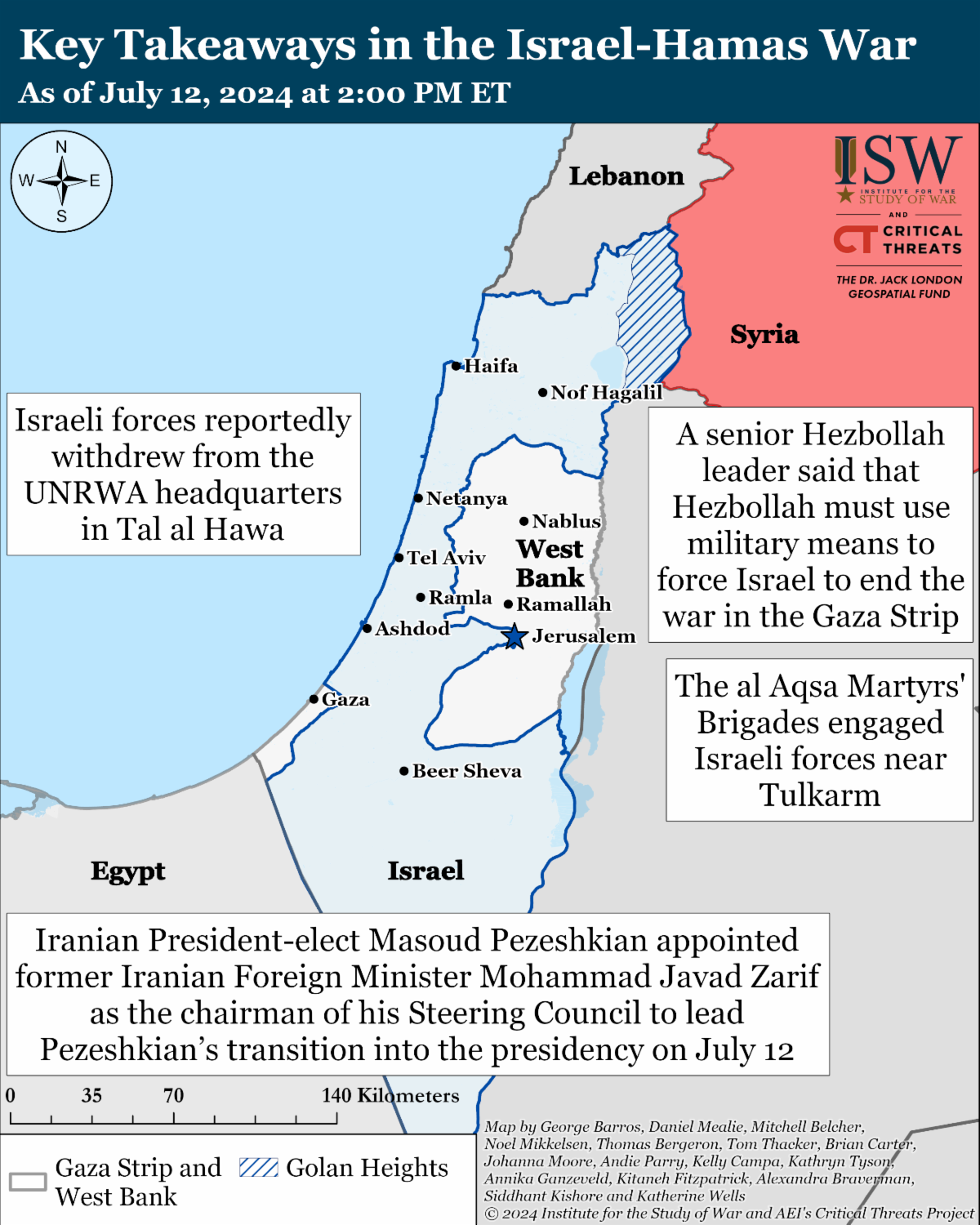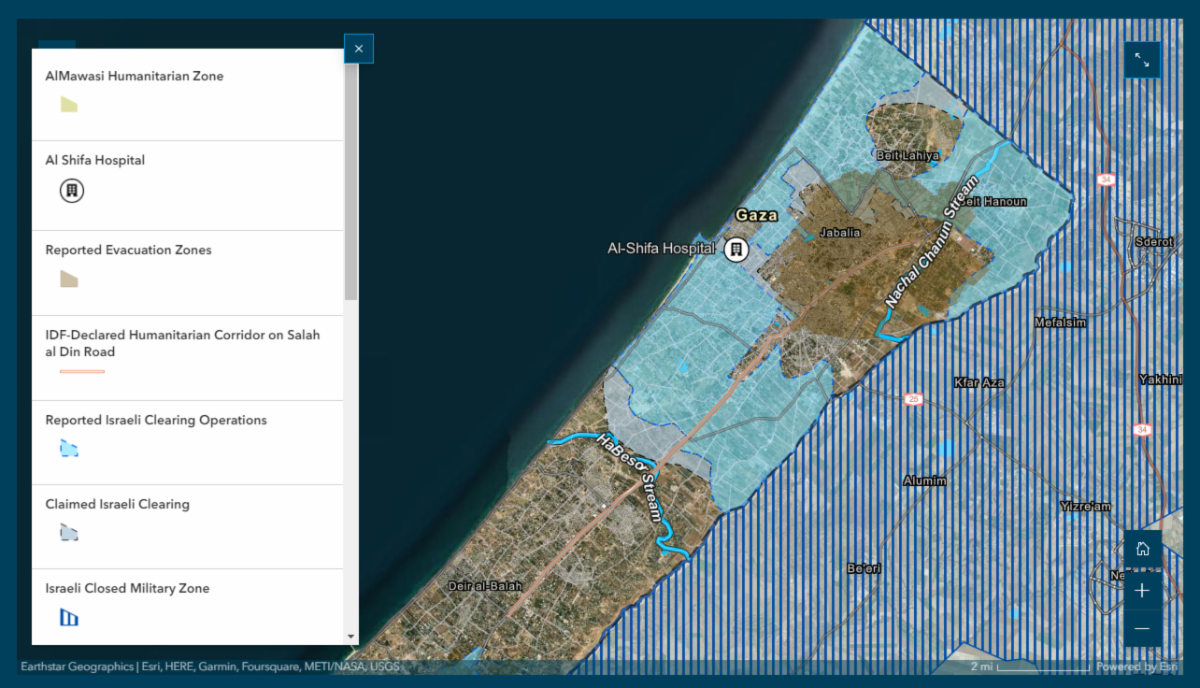Hamas continued to promote its postwar plan for a technocratic government to jointly rule the Gaza Strip and the West Bank. Hamas is content with this plan because it expects to maintain a monopoly on violence in the Gaza Strip, thereby controlling the government or evading its rule. Hamas official Hossam Badran said on July 12 that Hamas proposes that a national, non-partisan group assumes administration of the Gaza Strip and the West Bank after the war. Hamas has previously agreed to “technocratic” governments as part of a possible post-war Gaza Strip. Hamas approves of a “technocratic government” because Hamas understands that it would be able to exert influence over such a government given that Hamas expects to maintain a military arm in the Gaza Strip after the war. The ceasefire text currently under consideration does not contain a clause ensuring Hamas’ disarmament in the Gaza Strip, enabling Hamas to maintain control by force in the event of an Israeli withdrawal. Israel and Hamas do not currently have a framework to discuss Hamas’ disarmament under the current ceasefire proposals. Hamas official Hossam Badran called disbanding Hamas’ military wing a nonstarter. Hamas’ current demands regarding the phased ceasefire could also enable Hamas to drag on negotiations indefinitely with no mechanism to compel it to release the remaining hostages or commit to disarmament. Hamas leader in the Gaza Strip Yahya Sinwar would very likely fail to disarm in any event because to do so would result in Sinwar and Hamas losing a key element of their power in the Gaza Strip. Hamas forces throughout the Strip remain combat-effective and are attempting to reconstitute, with some success. Sinwar has noted that he believes Hamas has Israel “right where [Hamas] wants [Israel].” Hamas would continue to shape, intimidate, and control a technocratic government if the group retains a monopoly on violence in the Gaza Strip. Hamas has previously undermined Israeli attempts to set up alternative governance structures in the Gaza Strip and will likely continue to suppress political alternatives. Hamas could use its functioning military and internal security wings to coerce technocratic government employees at every level, thus providing Hamas with significant influence over the Gazan government even if Hamas officials were not officially controlling it. Hamas has a long history of killing and suppressing dissidents and political alternatives, including members of local Gazan clans who Israel has approached to form a non-Hamas authority after the war. Hamas would almost certainly act quickly to constrain and co-opt the activities of a technocratic government in the Strip in order to prevent it from seriously challenging Hamas’ military or governance activities. The latest proposal for a 2,500-strong US-trained interim security force would be insufficient to provide order and challenge Hamas’ monopoly on violence in the Gaza Strip.
Key Takeaways:
- Gaza Strip: Hamas continued to promote its postwar plan for a technocratic government to jointly rule the Gaza Strip and the West Bank. Hamas is content with this plan because it expects to maintain a monopoly on violence in the Gaza Strip thereby controlling the government or evading its rule. Hamas would continue to shape, intimidate, and control a technocratic government if the group retains a monopoly on violence in the Gaza Strip.
- Iran: Iranian President-elect Masoud Pezeshkian appointed former Iranian Foreign Minister Mohammad Javad Zarif as the chairman of his Steering Council to lead Pezeshkian’s transition into the presidency on July 12. This appointment is emblematic of Pezeshkian’s intent to seriously pursue negotiations with the West. Zarif’s appointment in the transition team illustrates how previously marginalized, moderate political elements are seeking to capitalize on Pezeshkian’s victory to re-enter the political conversations.
- Iran in Russia: Iranian Parliament Speaker Mohammad Bagher Ghalibaf conducted bilateral meetings with his counterparts from Russia, Ethiopia, Belarus, Kazakhstan, Armenia, and Tajikistan on the sidelines of the BRICS parliamentary forum in St. Petersburg, Russia, on July 11 and July 12.
- Lebanon: A senior Hezbollah leader said in a speech on July 12 that Hezbollah must use military force, rather than diplomatic talks, to force Israel to end the war in the Gaza Strip.
| 






 [ISW] 이란 업데이트, 2025년 3월 4일
[ISW] 이란 업데이트, 2025년 3월 4일
 [ISW] 이스라엘-하마스 전쟁(이란) 업데이트, 2024년 7월 11일
[ISW] 이스라엘-하마스 전쟁(이란) 업데이트, 2024년 7월 11일